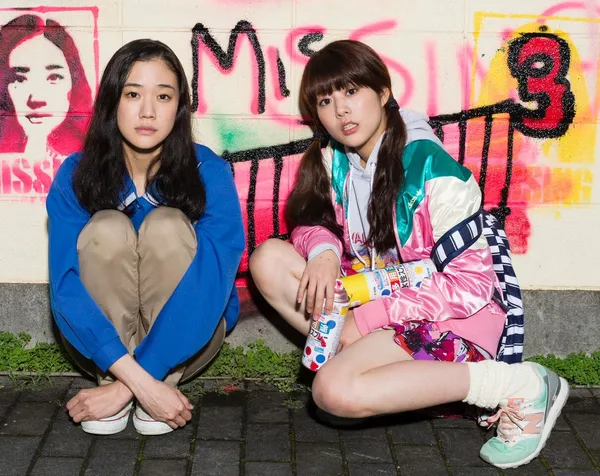Eye For Film >> Movies >> Japanese Girls Never Die (2016) Film Review
Japanese Girls Never Die
Reviewed by: Jennie Kermode

Although being impolite is easy, it's difficult to hurl a direct insult at somebody in Japanese as one might in English; the language simply doesn't have many offensive words, so insults need to be more carefully structured. Around 25 years ago, however, Japanese newspapers began to report on shocking language that scandalised polite society and suggested something had gone seriously awry with the country's youth. It wasn't the borrowing or invention of new forms of crudity, but something much more fundamental. Schoolgirls had begun to speak as if they were men.
This breakdown of gendered language (which is coded into word endings and sometimes word choice) had commentators speculating that bigger things were changing. What if girls began to reject traditional femininity altogether? What would happen to society? This film, showing at the Fantasia Film Festival in Montreal, takes these questions and runs with them.

Released at a time when new data shows that 43% of Japanese people are unmarried at the age of 30, when there are serious fears about the economic impact of the country having one of the lowest birth rates in the world, Japanese Girls Never Die is touching a nerve. It's a complicated film structured around obsession with the image of a young woman who has gone missing. When two young graffiti artists decide to use that image to make their name, a society that was bored by the Missing posters suddenly becomes fascinated. Men engage in lurid speculation. Has she been raped and murdered? Has some pervert locked her in a basement? She's quite pretty, they say.
Meanwhile, in an office, two men talk incessantly about women's bodies and women's proper role in front of their secretary, who later talks to her female boss and is shocked by the gap in their earnings. An apparently affectionate sexual encounter turns sour when a young man tells his female partner outright that his friend said she would be easy. There is discussion of how a woman in her twenties is getting old and a teenage girlfriend is a better catch. This is a portrait of society that might make any woman want to disappear.
Out on the streets, however, things are different. A gang of schoolgirls hunts down and beats men who foolishly opt to walk home alone at night. Their laughter as they run around the supermarket gathering weapons or brutally kick a businessman lying on his back in the park is joyous. Utterly free of inhibition, they demonstrate how easy it is for the tables to be turned. Is this where things end up when girls start to behave like men? Is it the turn of men to live in fear?
There's a lot here that's knowingly over the top. Some of the scenes of girl gang violence conjure up a gender-reversed A Clockwork Orange. But the film is also full of sharp little observations that retain the power of surprise, or discomfit in subtle ways. A young man says he likes the woman he has allowed to go back to his place, but doesn't want to have sex. "Then what was all that signalling about?" she asks. Had he been flirting, or was he asking for it because of the way he was dressed?
Although we follow individual stories through this mélange, the film is centred more on atmosphere than plot, and what is going on in the background is at least as important as the fate of any one person. Even a missing person. This isn't simply a call for revolution, with female characters also troubled by the violence of the gangs, but it's an invitation to do some serious thinking, and it's presented with energy and style.
Reviewed on: 14 Jul 2017
















